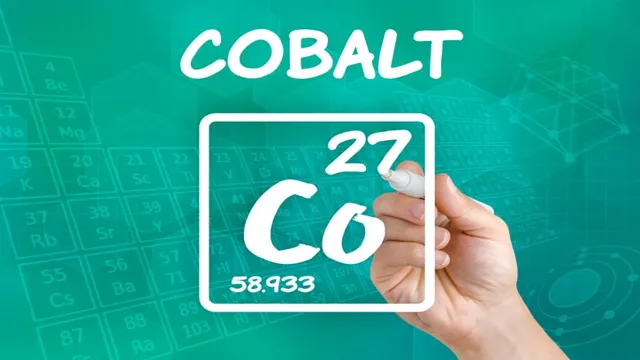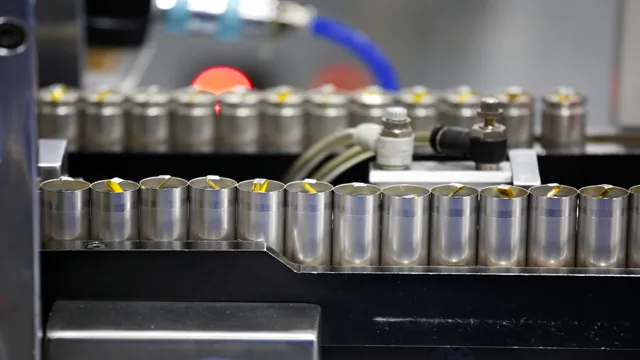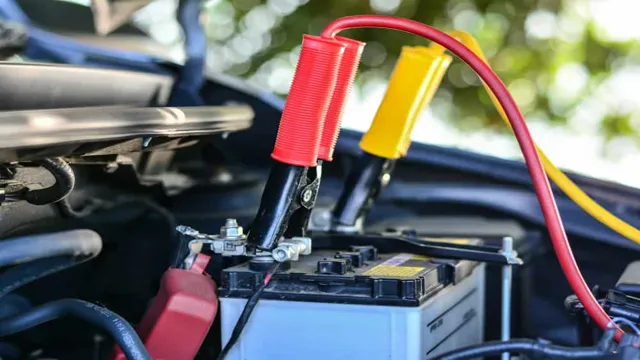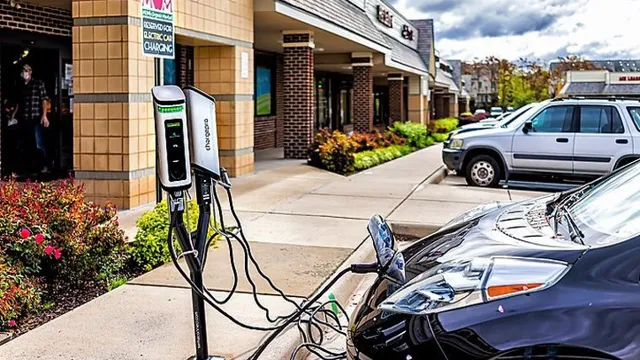Cobalt Revolution: Powering the Future of Electric Cars with Improved Batteries
Electric vehicles have taken the automobile industry by storm and it’s no surprise why. With their eco-friendliness, low emission rates, and overall cheaper fuel options, electric vehicles are the way forward. However, many wonder what goes into making these electric vehicles.
One of the major components that play a huge role in electric vehicles is their batteries. But have you ever stopped to wonder what makes these batteries tick? Well, that’s where cobalt comes in. Cobalt is a critical component in the manufacturing of electric car batteries.
It provides stability and a longer lifespan to these batteries, making them more authentic and accessible to use. It’s a rare mineral extracted from countries like the Democratic Republic of Congo and refines into a product that goes into making batteries with high energy density, longer life, and better performance. To put it into perspective, cobalt is like the spine of the electric car battery.
Without it, the battery would be prone to overheating, instability, and an overall shortened lifespan. Therefore, the demand for cobalt has skyrocketed over the years, with many battery and car manufacturers scrambling to ensure there’s enough cobalt for their products. In conclusion, cobalt plays a significant role in electric car batteries.
Without it, electric vehicles would still be a dream for many, and the current eco-friendly wave would struggle to gain traction. As we continue to move towards a greener future, the demand for cobalt will only increase.
What is Cobalt?
Cobalt is an element used to make electric car batteries. It is a crucial component that allows the batteries to store and release energy effectively. Without cobalt, the batteries would not be able to provide the power required to run electric vehicles.
Cobalt is also used in other electronics like smartphones and laptops, but its use in the EV industry is particularly important. However, there is a downside to the production of cobalt. Most of it is mined in the Democratic Republic of Congo, where child labor and environmental damage are common.
As such, companies are looking for ways to reduce the use of cobalt in batteries or find more ethical sources. Nonetheless, for now, cobalt remains an essential component of electric car batteries, ensuring they can provide the range and performance drivers expect.
Properties and Usage in Technology
Cobalt is a primarily hard, brittle metal that is widely used in our daily lives. It’s one of the three elemental substances used in the creation of magnets, along with iron and nickel. Its magnetic force is extremely strong, making it a valuable resource in the manufacturing of various electronic devices, such as hard disk drives, smart phones, and batteries.
Cobalt is also used to make alloys, which are commonly used to create high-strength metals for aircraft and drilling equipment. Despite its extensive usage, cobalt is still a relatively rare metal, and demand for it continues to rise as global economies and technologies advance. Its properties, such as its high melting point and resistance to corrosion, make cobalt a foundational metal in many industries.
As we continue to rely on technology more and more, we can expect that cobalt will become even more essential to our daily lives.

Why Cobalt is Crucial for Electric Car Batteries
Cobalt is a crucial component in the production of electric car batteries. In fact, it is a key ingredient in the battery cathode, which is an essential component in the process of storing and releasing energy to power the car. Cobalt helps to improve the overall performance and lifespan of the battery, as it enhances the stability and efficiency of the cathode.
Although there are concerns about the sustainability of cobalt mining and the potential environmental impact, efforts are being made to improve the supply chain and find alternative materials. Despite the challenges, cobalt is still an integral part of the electric vehicle industry and will continue to play a vital role in the future of transportation.
High Energy Density and Performance
Cobalt is a crucial component for electric car batteries due to its high energy density and performance. It is a metal that provides high stability and durability, making it an ideal material for battery cathodes. Cobalt can withstand high temperatures without decomposing, which is important for electric car batteries that generate a lot of heat during charging and discharging cycles.
Even though there are concerns about the ethical sourcing of cobalt, its unique properties make it essential for electric car battery production. Without cobalt, batteries would have to rely on less efficient materials, which would result in shorter driving ranges and slower acceleration. Therefore, while there are efforts to reduce the use of cobalt in electric car batteries, it remains a key component for the foreseeable future.
Durability and Longer Lifespan
When it comes to electric car batteries, durability and longer lifespan are essential factors that consumers prioritize. Cobalt plays a crucial role in achieving these goals. Cobalt is a rare and expensive metal that is used in the production of electric car batteries.
It helps in increasing the energy density of the battery pack, which improves the car’s range. Moreover, cobalt is known for its excellent thermal stability, making it less prone to overheating, which ensures the battery’s safety during use. Additionally, cobalt helps in maintaining the battery’s performance over a more extended period, which directly contributes to the battery’s longer lifespan.
Overall, cobalt is one of the essential materials that can make electric car batteries efficient, reliable, and durable, making it a crucial component in the transition to electric vehicles.
Cobalt Mining and Sustainability
Cobalt is one of the most essential components used to make electric car batteries. However, the mining of cobalt has raised serious concerns regarding sustainability. A large proportion of the world’s cobalt supply comes from the Democratic Republic of Congo, where child labor and poor working conditions have been reported.
Moreover, cobalt mining is often associated with environmental damage, including deforestation and water pollution. Cobalt mining has a high environmental impact, and the demand is expected to grow as electric cars become more popular. Therefore, it is essential that the industry explores sustainable practices to minimize the impact on people and the environment.
Companies are becoming more aware of these issues, and some are now investing in sustainable cobalt mining practices to ensure that the supply chain is more transparent and responsible.
Impact on Environment and Communities
Cobalt mining has a significant impact on both the environment and communities. In recent years, concerns have arisen about the sustainability of cobalt mining due to its negative effects on the environment. Mining activities produce large amounts of waste materials that can pollute nearby water sources and cause air pollution, leading to health problems for people living and working in the surrounding communities.
Additionally, the use of child labor in cobalt mines has been reported, highlighting the social impact of this industry. Many companies are working to improve sustainability in the cobalt mining industry by reducing waste, recycling materials, implementing ethical labor practices, and supporting local communities. However, it is important for consumers to be aware of the impact of the products they purchase and to support companies that prioritize sustainability in their supply chains.
By doing so, we can help ensure that cobalt mining is done responsibly and sustainably for the benefit of both people and the planet.
Alternatives to Traditional Mining
In recent years, there has been a growing concern about the sustainability of traditional cobalt mining practices. This is because mining activities often lead to environmental degradation, resulting in soil erosion, water contamination, and air pollution. Additionally, some mining companies have been accused of exploiting workers and engaging in unethical practices.
As a result, there has been an increasing need for alternative methods of obtaining cobalt. One such method is recycling. It involves the extraction of cobalt from used batteries, which reduces the need for new mining activities.
Another option is to use renewable energy sources such as solar power to mine cobalt. This approach not only reduces environmental impact but also provides a more sustainable source of energy. Furthermore, some companies are turning to responsible mining practices that prioritize the well-being of workers and the environment.
These practices involve using minimal amounts of water and other resources, reducing the use of toxic chemicals, and adopting better waste management practices. Overall, these alternatives to traditional cobalt mining offer a more sustainable path towards meeting the growing demand for this critical material.
Future Outlook for Cobalt and Electric Vehicles
Cobalt is expected to play a vital role in the electric vehicle industry, as it is a critical component of rechargeable batteries used in these cars. The demand for electric cars is rapidly increasing, with a shift towards sustainable energy sources to reduce carbon emissions. This trend is expected to drive the demand for cobalt in the future.
While cobalt is primarily mined in a few countries in Central Africa, there is a growing concern about the ethical and environmental issues surrounding its mining. Efforts are being made to find alternative materials to cobalt, which would make electric car batteries more affordable and sustainable. Despite this, cobalt is likely to remain a crucial part of the electric vehicle industry in the short term.
Its unique properties, such as stability and durability, make it an attractive option for battery manufacturers. As the world moves towards cleaner and greener energy solutions, cobalt will continue to be an important focus of research and development in the EV industry.
Rising Demand and Supply Chain Challenges
As the demand for electric vehicles continues to rise, so does the demand for cobalt. This essential mineral is a crucial component of the batteries that power EVs, making it a vital element of the supply chain. While the future outlook for cobalt appears promising, there are also some challenges that must be addressed.
One of the main issues is the ethical sourcing of cobalt, as much of it is currently mined in the Democratic Republic of the Congo, where labor practices and environmental standards are questionable. This has led to efforts by companies to ensure the responsible and sustainable sourcing of cobalt. Additionally, the volatility of the cobalt market due to supply and demand fluctuations can create challenges for EV manufacturers.
However, with advancements in technology and increased investment in mining and recycling, it is likely that these challenges will be addressed, leading to a more stable and sustainable future for the cobalt and EV industries.
Innovation in Battery Technology and Cobalt-Free Solutions
Electric Vehicles As the world shifts towards sustainable energy solutions, the demand for electric vehicles is increasing rapidly. However, one of the biggest challenges in the development of electric vehicles is the reliance on cobalt for battery production. Cobalt mining is not only environmentally damaging but also poses a significant human rights risk.
In response, there has been significant innovation in battery technology to reduce dependency on cobalt. A cobalt-free battery solution is a promising alternative as it eliminates the need for this costly mineral. Researchers are investigating various materials including manganese, nickel, and aluminum to create batteries with similar performance and durability as cobalt-based batteries.
These developments are not only environmentally conscious but also provide a more ethical solution for electric vehicle production. The future of electric vehicles looks bright as innovations in battery technology advance.
Conclusion
In conclusion, cobalt has proven to be a crucial element in the creation of electric car batteries. Its unique properties like conductivity and resilience make it the ideal material to power the cars of the future. Although it may be tempting to dismiss cobalt as just another metal, its importance in the development of sustainable technology cannot be overstated.
So the next time you see an electric car driving down the road, take a moment to appreciate the humble cobalt that helped make it possible. As they say, behind every great electric car is a great cobalt battery!”
FAQs
What is cobalt?
Cobalt is a chemical element with the symbol Co and atomic number 27.
Why is cobalt important in making electric car batteries?
Cobalt is an essential component of the cathode in lithium-ion batteries used in electric cars. It helps to improve energy density and increase the battery’s lifespan.
Where is cobalt primarily sourced from for making electric car batteries?
Most of the world’s cobalt comes from the Democratic Republic of Congo, which raises concerns about ethical mining practices and human rights abuses.
How much cobalt is needed for an electric car battery?
The amount of cobalt required for an electric car battery varies depending on the battery’s capacity, but typically ranges from 5-20% of the total weight. However, there are ongoing efforts to reduce the amount of cobalt needed in batteries to make them more sustainable.





